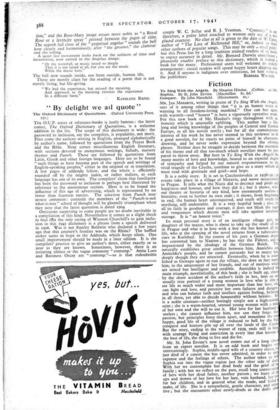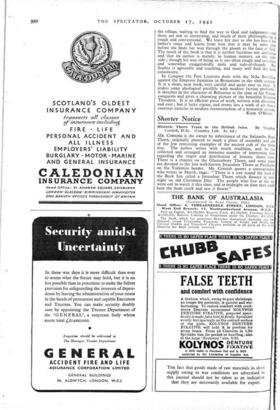Fiction
Conquer. By John Masefield. (Heinemann. 6s.)
MR. JAN MASARYK, writing in praise of To Sing With the Angels, says of it among other things. that " it is an honest voice of warning to all freedom-loving mankind." One can but agree with warmth—and " honest " is here a vigorously operative wort For this new book of Mr. Hindus's rings throughout with an
honesty which is unusually uplifting. This author has a life-
long and loving knowledge of the peoples of Central and. Eastern Europe, as all his novels testify ; but for all the contemporary interest of his work he has never seemed to -this reviewer to be a good novelist, for he exacts no pains of himself in character- drawing, and he never seeks expression beyond the obvious phrase. Neither does he struggle to decide between the essentials of his theme and all that too-much which novelists must be pre- pared to throw away. But here in To Sing With the Angels the many merits of love and knowledge, heated to an especial degree of sympathy and helped by our natural responsiveness to the vivid tragedy of the Czechs, combine to give us a story which all must read with gratitude and grief—and hope.
It is a noble story. It is set in Czechoslovakia in 1938-39; its events take place in a village of Moravia, and move occasionally to Prague. It tells what the Nazis did to decency and pride and happiness and honour, and how they did it ; but it shows, with- out theatre or hysteria of any kind; how enormously useless is brutality, even to further its own ends ; it shows, from beginning to end, the human heart unconquered, and truth still ready for anything, still undeniable. It is a very hopeful book ; also, for all its faith in goodness and courage, it does not blink the rages and vengeances which decent men will take against irrational outrage. It is " an honest voice."
Its main personal story is of an intelligent village girl, the daughter of the mayor, who is about to take up the study of law in Prague and who is in love with a boy she has known all her life, who at the opening of the novel returns from a tuberculosis cure in Karlsbad. In the course of his cure a German doctor has converted him to Nazism ; he has met the Fiihrer, and is impassioned by the ideology of the German Reich. This naturally establishes great conflict between him, Annichka and Annichka's people, and he cannot persuade her to marry him, deeply though they are attracted. Eventually, when he is estab- lished as Gestapo agent to run the village, she does in fact marry him, to the amazement of her friends, and out of motives which are mixed but Intelligent and credible. Annichka is indeed the main triumph, novelistically, of this book ; she is built up, almost by the sheer accident of the author's faith in her, into an usually true portrait of a young woman in love who is able t see life as much wider and more important than her love, who can fight and love, and perceive her own failures and dangers; and who can balance faith- and intellect against feeling, belies in all three, yet able to decide honourably without heroics. She to use it. Her love for her husband •i is a noble creature—neither boringly simple nor a high-mind saint ; she is a warm-hearted, sensual young woman with a rain of her own and the will useless ; she cannot influence him, nor can they forgo the passion, but principles force them apart, and meantime the on happy, good life of the village is reduced to hell by the N conquest and horrors pile up all over the lands of the Czech' But the story, ending in the winter of 1939, ends still in hoi- with courage flying and conviction in every line that honour the best of life, the thing to live and die for.
Mr. St. John Ervine's new novel comes out of a long silen from an expert novelist. It is an odd book and begins s' entertainingly. Sophia, middle-aged wife of a country rector, just died of a cancer she has never admitted, in order to s expense and the feelings of others. The author takes us Sophia out into the vague region just the other side of dea With her we contemplate her dead body and the grief of h family ; with her we reflect on the past, recall long conversatio of hers with her dead father, another parson ; we learn of ups and downs of her love for her lazy, vain husband, her 1 for her children, and in general what she made, and failed make, of life. She is a sympathetic, gentle character, and at tive ; but she encounters other newly-deads as she drifts a
the village, waiting to find the way to God and judgement—and these are not so interesting, and much of their philosophising is rough and conventional. We leave her just as she has heard her father's voice and learns from him that it may be some time before she finds her way through the gloom to the face of God. The merit of the book is that it is neither facetious nor ambitious and that its author is mainly, in human matters, on the right side ; though his way of being so is too often rough and crotchety and somewhat exaggeratedly male and rule-of-thumb. But Sophia is agreeable and touching, and many will find the book consolatory.
In Conquer the Poet Laureate deals with the Mica Rebellion against the Emperor Justinian in Byzantium in the sixth century. It is a short, neat book, very careful and quite easy to read. It makes some ideological parallels with modern faction problems; it sketches in the character of Belisarius at the time of his Persian conquests and gives a charming picture of the beautiful Empress Theodora. It is an efficient piece of work, written with discretion and ease ; but it lacks vigour, and seems less a work of art than a cautious exercise in modern reconstruction of a historical episode,
KATE O'BRIEN.



























 Previous page
Previous page